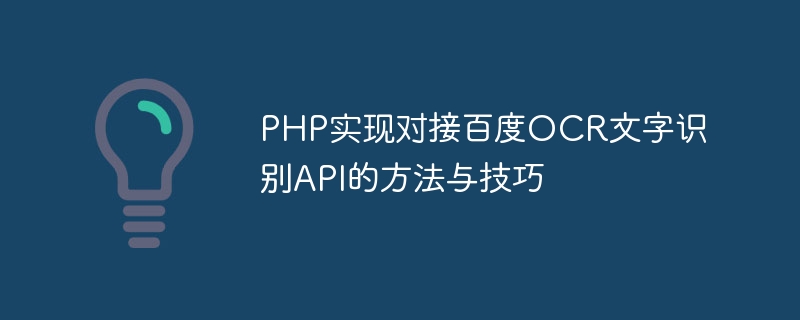Home >Backend Development >PHP Tutorial >Methods and techniques for connecting Baidu OCR text recognition API with PHP
Methods and techniques for connecting Baidu OCR text recognition API with PHP
- WBOYWBOYWBOYWBOYWBOYWBOYWBOYWBOYWBOYWBOYWBOYWBOYWBOriginal
- 2023-08-13 23:19:442002browse

Methods and techniques for PHP to interface with Baidu OCR text recognition API
With the rapid development of artificial intelligence, text recognition has become a very popular field. Baidu OCR Text Recognition API is a powerful text recognition tool that can help developers quickly recognize and extract text. This article will introduce how to use PHP to implement methods and techniques for docking Baidu OCR text recognition API, and provide code examples.
Step 1: Register a Baidu Cloud account and create an application
First, we need to register an account on the Baidu Cloud official website and create an application. After successful registration, you will obtain an API Key and Secret Key. These two keys are important credentials for subsequent authentication.
Step 2: Install Baidu OCR PHP SDK library
Before using PHP to connect to Baidu OCR text recognition API, we need to install Baidu OCR PHP SDK library first. Developers can find the officially provided PHP SDK library on GitHub and install and configure it according to the official documentation.
Step 3: Import the Baidu OCR PHP SDK library and configure it
Introduce the Baidu OCR PHP SDK library into the project, configure it in the code, and set the API Key and Secret Key to global variable. The following is a simple example:
require_once 'vendor/autoload.php'; use BaiduAipOcr; // 设置APPID/AK/SK const APP_ID = 'your app id'; const API_KEY = 'your api key'; const SECRET_KEY = 'your secret key'; $client = new Ocr(APP_ID, API_KEY, SECRET_KEY);
Step 4: Call the API for text recognition
After the configuration is completed, we can call the Baidu OCR text recognition API for text recognition. The following is an example that demonstrates how to perform text recognition on an image:
// 调用百度OCR文字识别API
$image = file_get_contents('path/to/your/image.jpg');
$result = $client->basicGeneral($image);
// 解析识别结果
if (isset($result['words_result'])) {
foreach ($result['words_result'] as $word) {
echo $word['words'] . "
";
}
} else {
echo '文字识别失败';
}In the above example, we first read the image to be recognized as a binary stream and call # in Baidu OCR SDK ##basicGeneral method for text recognition. The recognition results are included in the returned array, and the recognition results of each text can be obtained by traversing the array.
$file = 'path/to/output.txt';
if (isset($result['words_result'])) {
$data = "";
foreach ($result['words_result'] as $word) {
$data .= $word['words'] . "
";
}
file_put_contents($file, $data);
} else {
echo '文字识别失败';
}Summary: This article introduces how to use PHP to implement methods and techniques for docking Baidu OCR text recognition API. We first register a Baidu Cloud account and create an application, then install the Baidu OCR PHP SDK library and configure it, and finally call the API for text recognition and process the recognition results. I hope this article will help you understand and use Baidu OCR text recognition API. If you encounter problems during practice, it is recommended to consult the official documentation or consult Baidu Cloud technical support. The above is the detailed content of Methods and techniques for connecting Baidu OCR text recognition API with PHP. For more information, please follow other related articles on the PHP Chinese website!

